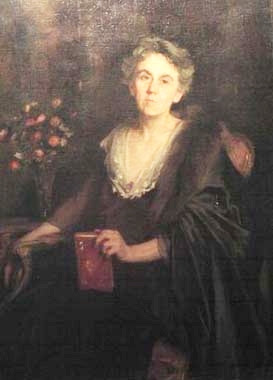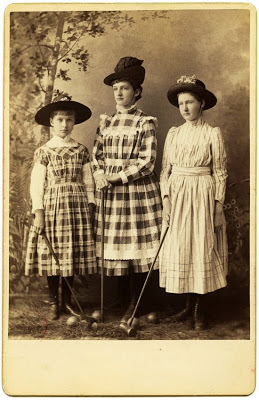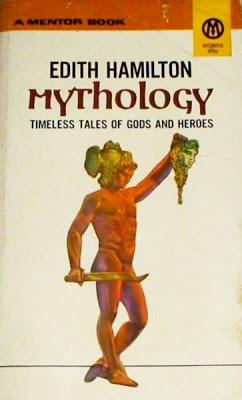Philosophy

 Edith Hamilton, Kitty Bent and Elizabeth Pratt
Edith Hamilton, Kitty Bent and Elizabeth Pratt

The Writer's Almanac...
It's the birthday of classical scholar Edith Hamilton, born to American parents in Dresden, Germany (1867). She grew up in Fort Wayne, Indiana. She had two sisters, and their father didn't think much of public schools so he taught all the girls himself. He began teaching Edith Latin when she was seven, and after six weeks of instruction he assigned her a translation of Caesar. Her father also taught her Greek, German, and French.
After this academic childhood, she was sent off to Miss Porter's School in Farmington, Connecticut, a "finishing school" for young women. The school provided a solid education, but it was not meant to prepare women for college. So after she was finished at Miss Porter's, Hamilton threw herself into studying so that she could pass the difficult entrance exam for Bryn Mawr College, near Philadelphia. She did pass, and after graduating from Bryn Mawr, she went off to Europe with her sister Alice. Edith was hoping to earn a doctorate from the University of Leipzig, but she found that women were not allowed to earn such advanced degrees there. So she went to the University of Munich. She was the first woman to attend classes there, and her professors made her sit up on the stage next to them while they lectured so that the male students would not have to interact with her.
Hamilton was on a path toward earning her Ph.D. at Munich when she got a job offer to be the first headmistress of Bryn Mawr Preparatory School in Baltimore, a school created with the intention of actually preparing girls for college. Hamilton's father had recently lost his money, and earning an income seemed more necessary than it had before. So she left Germany and, at the age of 29, showed up to run Bryn Mawr School. She said: "I was very young and very ignorant when I first came to Baltimore and, I may say, very, very, frightened. I remember vividly saying to myself as I traveled down here, 'If I were put in charge of running this train, I could hardly know less how to do it than I know how to run the Bryn Mawr School.'"
She was extremely successful as the head of the school, and she remained there for 26 years. In addition to her administrative duties, she spent a lot of time trying to convince parents of prospective students that it was worth investing in education for girls. Sometimes she got to teach, and she was famous for her passionate lectures on the importance of the classics. Mary Armstrong Shoemaker, a teacher at Bryn Mawr School, said: "One day when a friend confessed that she did not really know the difference between Sophocles, Euripides, and Aeschylus (the three great Greek writers of tragedy), Edith cried, 'My dear child,' leapt to her feet, and began pulling volumes off the shelves, translating bits from each poet and explaining their differences with such humor and passion that someone who was there said, 'She made me feel she must have just had lunch with Aeschylus.'"
The story goes that Hamilton tried to retire sooner than the 26 years she ended up staying at Bryn Mawr, but that the board refused her resignation for several years because she was so well-liked. After retiring, she bought a house on the coast of Maine, where she spent summers with her partner, Doris Fielding Reid. Reid was a former student of Hamilton's who became an investment banker. She worked and Edith kept house. They spent their winters in New York City or Washington, D.C., with a lively circle of friends. Hamilton often entertained her social circle with casual lectures and anecdotes about Greek tragedy, and her friends encouraged her to write her thoughts down and publish them. She refused over and over, but finally the editor of Theater Arts Monthly convinced her to submit a piece. It was such a success that she continued to write articles, and collected them into her first book, The Greek Way (1930), published when she was 63 years old. In The Greek Way, she wrote: "The Greeks were not the victims of depression. Greek literature is not done in gray or with a low palette. It is all black and shining white or black and scarlet and gold. The Greeks were keenly aware, terribly aware, of life's uncertainty and the imminence of death. Over and over again, they emphasize the brevity and the failure of all human endeavor, the swift passing of all that is beautiful and joyful. To Pindar, even as he glorifies the victor in the games, life is 'a shadow's dream.' But never, not in their darkest moments, do they lose their taste for life. It is always a wonder and a delight, the world a place of beauty, and they themselves rejoicing to be alive in it. Quotations to illustrate this attitude are so numerous, it is hard to make a choice. One might quote all the Greek poems there are, even when they are tragedies."
Hamilton made up for lost time by writing many more books, including The Roman Way (1932); Spokesmen for God (1949); Echo of Greece (1957); and most famously, Mythology: Timeless Tales of Gods and Heroes (1942), a retelling of the Greek myths. In 1957, she was made an honorary citizen of Athens, and she visited Greece for the first time in her life, at the age of 90.
She said: "It has always seemed strange to me that in our endless discussions about education so little stress is laid on the pleasure of becoming an educated person, the enormous interest it adds to life. To be able to be caught up into the world of thought — that is to be educated."
Edith Hamilton [Wikipedia]
- Greek Tragedy As Intellectual Expression
We?ve been talking about the intellectual accomplishments of the ancient Greeks and unique contribution they made to the history of mankind. This creative capability existed in both the Dorian and Ionian races because we know that Sparta made a contribution...
- Students Still Like "real" Books?
"In a Digital Age, Students Still Cling to Paper Textbooks" by Lisa Foderaro October 19th, 2010 The New York Times They text their friends all day long. At night, they do research for their term papers on laptops and commune with their parents on Skype....
- Johns Hopkins' 1st Woman Ph.d. In 1893--florence Bascom
Florence Bascom July 14th, 1862 to June 18th, 1945 Geological Society of America's magazine... Bascom was the first woman hired by the U.S. Geological Survey (1896), the first woman to present a paper before the Geological Society of Washington (1901),...
- Lewis Carroll [charles Lutwidge Dodgson]--birthday
It's the birthday of an accomplished writer, mathematician, and photographer...Lewis Carroll [Charles Lutwidge Dodgson]. The Writer's Almanac: It's the birthday of the man who wrote Alice's Adventures in Wonderland (1865) and Through...
- William Rowan Hamilton's "theory Of Systems Of Rays"
William Rowan Hamilton August 4th, 1805 to September 2nd, 1865 In 1827, William Rowan Hamilton presented his Theory of Systems of Rays at the Royal Irish Academy in Dublin. Although he was still an undergraduate, only 21 years old, his work is one of...
Philosophy
Edith Hamilton...classical scholar

 Edith Hamilton, Kitty Bent and Elizabeth Pratt
Edith Hamilton, Kitty Bent and Elizabeth Pratt

The Writer's Almanac...
It's the birthday of classical scholar Edith Hamilton, born to American parents in Dresden, Germany (1867). She grew up in Fort Wayne, Indiana. She had two sisters, and their father didn't think much of public schools so he taught all the girls himself. He began teaching Edith Latin when she was seven, and after six weeks of instruction he assigned her a translation of Caesar. Her father also taught her Greek, German, and French.
After this academic childhood, she was sent off to Miss Porter's School in Farmington, Connecticut, a "finishing school" for young women. The school provided a solid education, but it was not meant to prepare women for college. So after she was finished at Miss Porter's, Hamilton threw herself into studying so that she could pass the difficult entrance exam for Bryn Mawr College, near Philadelphia. She did pass, and after graduating from Bryn Mawr, she went off to Europe with her sister Alice. Edith was hoping to earn a doctorate from the University of Leipzig, but she found that women were not allowed to earn such advanced degrees there. So she went to the University of Munich. She was the first woman to attend classes there, and her professors made her sit up on the stage next to them while they lectured so that the male students would not have to interact with her.
Hamilton was on a path toward earning her Ph.D. at Munich when she got a job offer to be the first headmistress of Bryn Mawr Preparatory School in Baltimore, a school created with the intention of actually preparing girls for college. Hamilton's father had recently lost his money, and earning an income seemed more necessary than it had before. So she left Germany and, at the age of 29, showed up to run Bryn Mawr School. She said: "I was very young and very ignorant when I first came to Baltimore and, I may say, very, very, frightened. I remember vividly saying to myself as I traveled down here, 'If I were put in charge of running this train, I could hardly know less how to do it than I know how to run the Bryn Mawr School.'"
She was extremely successful as the head of the school, and she remained there for 26 years. In addition to her administrative duties, she spent a lot of time trying to convince parents of prospective students that it was worth investing in education for girls. Sometimes she got to teach, and she was famous for her passionate lectures on the importance of the classics. Mary Armstrong Shoemaker, a teacher at Bryn Mawr School, said: "One day when a friend confessed that she did not really know the difference between Sophocles, Euripides, and Aeschylus (the three great Greek writers of tragedy), Edith cried, 'My dear child,' leapt to her feet, and began pulling volumes off the shelves, translating bits from each poet and explaining their differences with such humor and passion that someone who was there said, 'She made me feel she must have just had lunch with Aeschylus.'"
The story goes that Hamilton tried to retire sooner than the 26 years she ended up staying at Bryn Mawr, but that the board refused her resignation for several years because she was so well-liked. After retiring, she bought a house on the coast of Maine, where she spent summers with her partner, Doris Fielding Reid. Reid was a former student of Hamilton's who became an investment banker. She worked and Edith kept house. They spent their winters in New York City or Washington, D.C., with a lively circle of friends. Hamilton often entertained her social circle with casual lectures and anecdotes about Greek tragedy, and her friends encouraged her to write her thoughts down and publish them. She refused over and over, but finally the editor of Theater Arts Monthly convinced her to submit a piece. It was such a success that she continued to write articles, and collected them into her first book, The Greek Way (1930), published when she was 63 years old. In The Greek Way, she wrote: "The Greeks were not the victims of depression. Greek literature is not done in gray or with a low palette. It is all black and shining white or black and scarlet and gold. The Greeks were keenly aware, terribly aware, of life's uncertainty and the imminence of death. Over and over again, they emphasize the brevity and the failure of all human endeavor, the swift passing of all that is beautiful and joyful. To Pindar, even as he glorifies the victor in the games, life is 'a shadow's dream.' But never, not in their darkest moments, do they lose their taste for life. It is always a wonder and a delight, the world a place of beauty, and they themselves rejoicing to be alive in it. Quotations to illustrate this attitude are so numerous, it is hard to make a choice. One might quote all the Greek poems there are, even when they are tragedies."
Hamilton made up for lost time by writing many more books, including The Roman Way (1932); Spokesmen for God (1949); Echo of Greece (1957); and most famously, Mythology: Timeless Tales of Gods and Heroes (1942), a retelling of the Greek myths. In 1957, she was made an honorary citizen of Athens, and she visited Greece for the first time in her life, at the age of 90.
She said: "It has always seemed strange to me that in our endless discussions about education so little stress is laid on the pleasure of becoming an educated person, the enormous interest it adds to life. To be able to be caught up into the world of thought — that is to be educated."
Edith Hamilton [Wikipedia]
- Greek Tragedy As Intellectual Expression
We?ve been talking about the intellectual accomplishments of the ancient Greeks and unique contribution they made to the history of mankind. This creative capability existed in both the Dorian and Ionian races because we know that Sparta made a contribution...
- Students Still Like "real" Books?
"In a Digital Age, Students Still Cling to Paper Textbooks" by Lisa Foderaro October 19th, 2010 The New York Times They text their friends all day long. At night, they do research for their term papers on laptops and commune with their parents on Skype....
- Johns Hopkins' 1st Woman Ph.d. In 1893--florence Bascom
Florence Bascom July 14th, 1862 to June 18th, 1945 Geological Society of America's magazine... Bascom was the first woman hired by the U.S. Geological Survey (1896), the first woman to present a paper before the Geological Society of Washington (1901),...
- Lewis Carroll [charles Lutwidge Dodgson]--birthday
It's the birthday of an accomplished writer, mathematician, and photographer...Lewis Carroll [Charles Lutwidge Dodgson]. The Writer's Almanac: It's the birthday of the man who wrote Alice's Adventures in Wonderland (1865) and Through...
- William Rowan Hamilton's "theory Of Systems Of Rays"
William Rowan Hamilton August 4th, 1805 to September 2nd, 1865 In 1827, William Rowan Hamilton presented his Theory of Systems of Rays at the Royal Irish Academy in Dublin. Although he was still an undergraduate, only 21 years old, his work is one of...
